|
|
|
Sort Order |
|
|
|
Items / Page
|
|
|
|
|
|
|
| Srl | Item |
| 1 |
ID:
121054
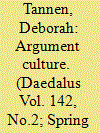

|
|
|
|
|
| Publication |
2013.
|
| Summary/Abstract |
Agonism - taking a warlike stance in contexts that are not literally war - pervades our public and private discourse, leading us to approach issues and each other in an adversarial spirit. The resulting "argument culture" makes it more difficult to solve problems and is corrosive to the human spirit. While examples from the intertwined domains of politics and the press may seem beyond individuals' power to change, the domain of private interactions - where equally destructive effects of the argument culture are felt - is one in which individuals have power to make quotidian yet revolutionary contributions to the common good.
|
|
|
|
|
|
|
|
|
|
|
|
|
|
|
|
| 2 |
ID:
167417


|
|
|
|
|
| Summary/Abstract |
This article analyses climate change activism through the framework of agonism. It discusses dominant political theories of climate change and then contrasts those with agonism. Next, it proceeds to analyse the logic of resistance in climate change activism, focusing on the 2017 People’s Climate March (PCM17) to understand how it articulated both its conceptions of the political and of climate change. This article argues that, in articulating its logic of resistance, the PCM17 served to depoliticise climate change by embracing a consensus-based conception of the political and a singular conception of climate change. The PCM17’s claim of resistance therefore constrained dissent and was ultimately counterproductive to a vibrant politics of climate change. Rather than understanding climate change as singular, I argue that reconsidering climate change as multiple – that is, as an unstable, contested representation of multiple political ecologies – provides the political space necessary to accommodate dissent in debate about climate change without abdicating the responsibility to acknowledge its existence as a political problem. An agonistic framework of climate change politics severs the tie between the political and consensus, allowing a radical democratic politics of climate change to adopt a robust logic of resistance in climate change activism.
|
|
|
|
|
|
|
|
|
|
|
|
|
|
|
|
| 3 |
ID:
163059
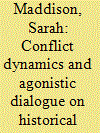

|
|
|
|
|
| Summary/Abstract |
This article contends that the type of high-level political consensus needed to reach a peace agreement is often insufficient for rebuilding and transforming wider social relations. Consensus-focused processes tend to suppress divergent views and experiences of conflict, particularly among grassroots conflict actors, and risk deepening social divides by homogenising diverse memories of past violence, with potentially dangerous consequences. In response to these concerns this article advances an understanding of agonistic dialogue and explores an example of such dialogue in communal conflict in Indonesia. Building on an understanding of effective dialogue as sustained, intensive and relational, this article also underscores the need for effective dialogue to have politico-institutional support and to be locally driven and owned by actors who are legitimate and trusted in the eyes of conflict protagonists.
|
|
|
|
|
|
|
|
|
|
|
|
|
|
|
|
| 4 |
ID:
165937
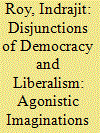

|
|
|
|
|
| Summary/Abstract |
In this paper, I make a case for appreciating the ‘agonistics of democracy’ by reflecting on political changes in the state of Bihar in eastern India since 1990. These changes compel us to appreciate the substantive deepening of democracy in Bihar despite the absence of values commonly associated with liberalism. I first highlight the emergence of ‘Backward Caste’ assertion in the state, which sought to construct the broadest possible alliance against the so-called ‘Forward Castes’ and culminated in the ascendancy of the Janata Dal government of Lalu Prasad Yadav in 1990. I next point to the inchoate antagonism harboured by poor people against the privileged who seek to assert their caste supremacy. Describing the vocabularies of dignity in which such supremacy is contested, I demonstrate that conflict is entwined with co-operation in poor people’s quotidian engagements with the privileged classes. In conclusion, I argue that an ‘agonistics of democracy’ allows us to step beyond the limitations of existing approaches to theorising democracy. I focus in particular on two such approaches: the liberalism-inspired approach dominant in many contemporary readings of democracy in India, and the critical alternatives offered by the political society-centred approach. The agonistic approach to democracy proposed in this paper enables scholars to leverage the strengths of both these approaches while avoiding their pitfalls.
|
|
|
|
|
|
|
|
|
|
|
|
|
|
|
|
| 5 |
ID:
124628
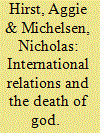

|
|
|
|
|
| Publication |
2013.
|
| Summary/Abstract |
Friedrich Nietzsche's proclamation of the 'Death of God' has come to function as something akin to a heuristic device in International Relations (IR) signifying the shattering of metaphysical and ontological certainty in European (post)modernity. According to Chris Brown, Nietzsche's declaration is commonly believed to signify a 'crisis in thought' which constitutes a 'genuine danger' insofar as it risks 'the collapse of the foundations of the old world order'.1 Roland Bleiker notes that such a crisis is deemed by many to be symptomatic of the loss 'of a generally accepted worldview that provided a stable ground from which it was possible to assess nature, knowledge, common values, truth, politics - in short, life itself'.2 This forum seeks to interrogate the substance and consequences of the claim that 'God is Dead' in the context of global politics, and specifically its implications for IR theory, contemporary political violence, and questions of ethics and responsibility.3 Before providing an overview of the points of synergy, agonism and divergence in the papers, this introduction will offer some contextualising remarks relating to the metaphysical, conceptual and historical parameters of the 'Death of God', marking its emergence in European political thought and provisionally mapping the terrain of its pertinence to contemporary IR.
|
|
|
|
|
|
|
|
|
|
|
|
|
|
|
|
| 6 |
ID:
143580
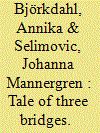

|
|
|
|
|
| Summary/Abstract |
This article explores agonistic processes of peace, which are situated within and constitutive of different spaces and places. Three contested cities, Sarajevo, Mostar and Višegrad in Bosnia-Herzegovina, provide us with local sites where peace and peace building in various forms ‘take place’ as people come together in collective action. Through a close reading of three symbolically and materially important bridges in the towns, we reveal meaning-making processes, as agentive subjects struggle around competing claims in the post-conflict everyday world. The collective, situated and fleeting agency that we explore through the Arendtian notion of ‘space of appearance’ invests space with meaning, belonging and identity. Thus, this article grapples with agonistic peace as it manifests itself in materiality and spatial practices. We use the social and material spaces of the city to locate agency and agonism in peace building as they relate to the conflict legacy in Mostar, Višegrad and Sarajevo in order to advance the critical peace research agenda.
|
|
|
|
|
|
|
|
|
|
|
|
|
|
|
|
|
|
|
|
|